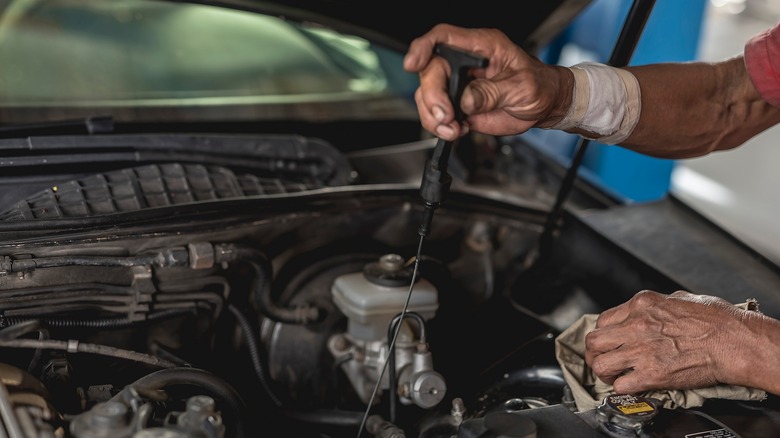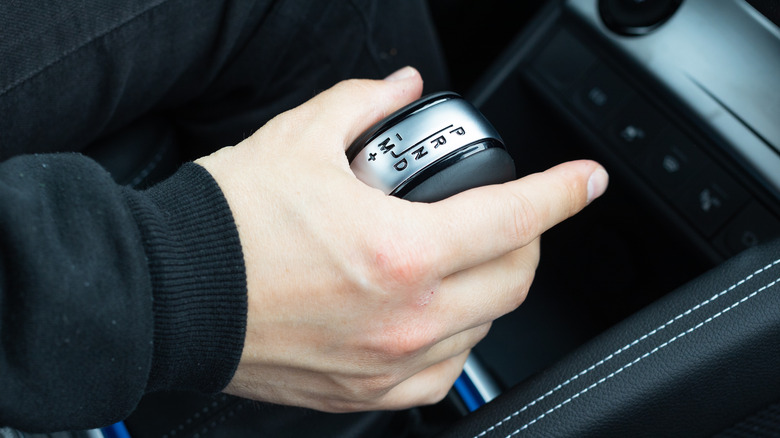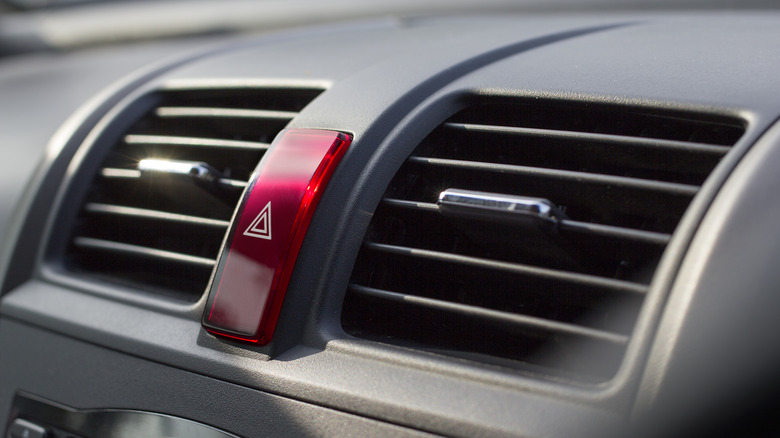Common Automatic Transmission Problems (And How To Diagnose Them)
The entire reason you drive an automatic transmission instead of a manual one is that it's much easier overall in terms of actual driving and caring for it — not to mention that stick shifts are a dying breed. The vast majority of automatic transmission systems are designed to work perfectly in tandem with one another, not unlike the gears of a clock. Beyond the occasional refreshing of transmission fluid, there shouldn't need to be any in-depth investigations. Of course, mechanics wouldn't be a thing if our machinery worked that consistently.
Occasionally, for one reason or another, your automatic transmission may suddenly begin to exhibit unusual, concerning behaviors. When this happens, the proper course of action is to schedule an appointment with your local mechanic to get your car serviced. Before that, though, a little bit of sleuthing may help you to identify the problem, which you can then pass on to your mechanic to hopefully expedite the repair process.
Low transmission fluid
Your car is a veritable water park of fluids and goops, from gasoline to wiper fluid to motor oil, each serving a particular purpose in the vehicle's overall operation. In the case of your automatic transmission, the vital fluid of choice is, of course, transmission fluid, which keeps the various moving parts of the gearbox cooled and lubricated as they shift, spin, and so on.
While transmission fluid can degrade from time and heat, but it doesn't burn off as oil; there's only supposed to be so much in there at a time. Therefore, if the fluid levels are low, that's an immediate red flag. The likely cause is a leak, possibly from a gasket or seal on the cooler lines. If you drive your car around and notice a small trail of reddish liquid behind you, that's transmission fluid falling out.
You can verify a fluid leak by checking your transmission's dipstick. If the stick measures low, fluid is somehow leaving the transmission. It's also possible that there's enough fluid, but it's been there too long and started to congeal. Fresh transmission fluid is reddish and smells faintly sweet, while expired fluid is more brownish and has a bit of a burning smell.
Grinding or slipping gears
When you shift the gears on your car's automatic stick shifter, it's supposed to be a very quick, seamless experience, so much so that you barely register the action: grab it, shift it, drive. When that shifter is either not responding or responding too much, you have a problem.
On the one hand, your shifter may grind while trying to shift. You might need to put an unusually high amount of force into pushing or pulling the lever, often accompanied by the feeling of a blockage in the lever. On the other hand, when shifting gears, the lever may slide out of the gear you were going for and go all the way to the other end of the selector.
These problems are two sides of the same coin and can have similar causes. Those causes can include low or degraded transmission fluid in the best-case scenario or worn-out transmission bands and gears in the worst case.
Unusual smells
When you own a car for a while, it can begin to exude all manner of unusual odors, usually reminiscent of whatever you get up to on a daily basis. If you eat a lot in your car, it'll smell like food; if you hike a lot, it'll smell like dirty boots, and so on. It's when you detect a distinctly unfamiliar scent that you should be concerned, and doubly so if the smell in question is noticeably fiery.
A burning smell in your car can come from a variety of sources. You are driving a gigantic hunk of hot metal, after all. But if you focus your nose a bit, you may be able to determine where the smell is coming from and, more importantly, if it's related to your transmission.
The smell you should be on the lookout for is a sulfurous one, like rotten eggs, coming from the vents. When the fluid in your automatic transmission starts to go stale, it can produce this eggy aroma, which circulates throughout your car. Besides being generally unpleasant, it's a warning sign that something is probably about to go wrong with your transmission if it hasn't already.
Clunking or grinding noises while driving
When you shift gears on your automatic transmission's gear selector, you should only ever hear a single sound, the distinctive "ga-chunk" of the gears changing. After that, your shifter and transmission should be nearly silent for the entirety of your drive. If you start hearing loud, unusual noises from your car while driving, that's a sign that something has gone weird somewhere.
As far as the transmission is concerned, you should listen for grinding, clunking, or buzzing noises. When the transmission fluid is low, or if the parts of your gearbox are old and worn out, they can start grinding against one another while the car is moving. Gears get stuck momentarily before being forcefully shoved; worn spokes spin out of alignment, or a big glob of expired fluid lodged somewhere. While it's easy to brush off these sounds as "things a car does," if you shouldn't be hearing any of them (and you shouldn't), then they're all reasons to seek service.
Unresponsive gears
It goes without saying that when you're backing out of a parking space, you kind of expect your car to start moving after shifting into reverse. In some extreme circumstances, though, it's possible for your car to completely refuse to go into any gear, even if the engine is running.
There are a couple of potential causes for this little headache. Once again, the most likely suspect is the transmission fluid; if a chunk of expired fluid is lodged in a particularly vital spot of the gearbox, then nothing will move until it's removed. If your fluid is fine, the cause could also be worn or broken parts, such as the clutch linkage or shift cables.
For those driving newer cars, your onboard computer system may even be the culprit. Many newer cars leave some of the background aspects of the gearbox to the onboard systems, but if something goes wrong with those systems, the whole thing locks up. Whatever the cause, call a tow truck because you're not going anywhere.





